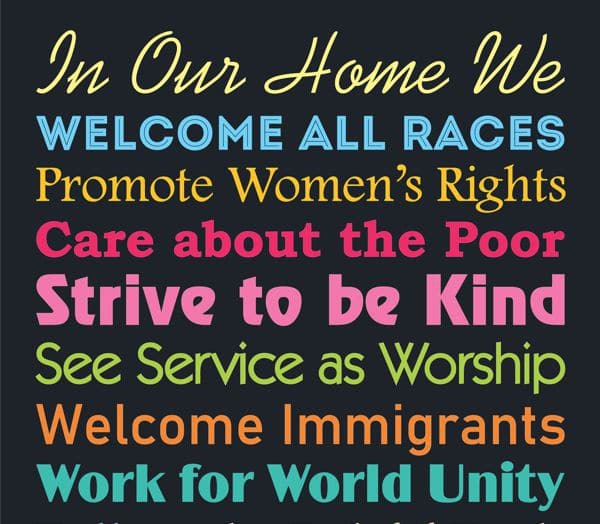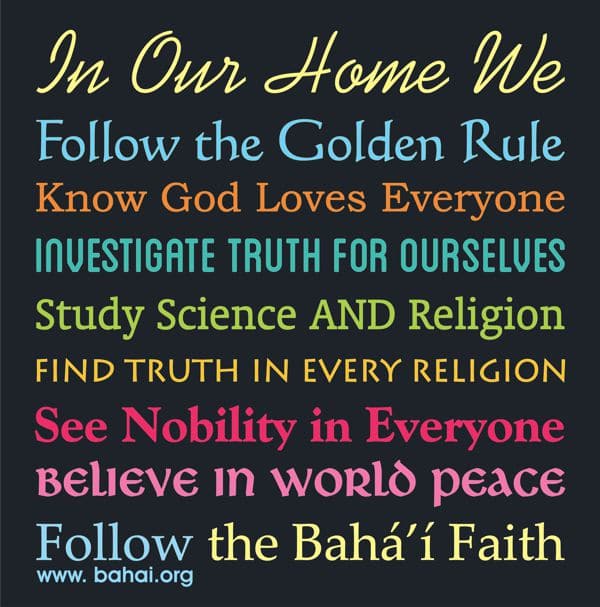Many people see religion, belief and faith as the opposites of science, reason and knowledge. They look at history and find evidence that religion has often encouraged fanaticism, bigotry, violence, superstition and magical thinking. It has also been used to make people feel guilty, evil or unworthy of love, and has been used by men in authority to control the behavior of women and the poor. For these reasons and many others, it has become popular in some circles to claim that religion has done more harm than good in the world.
If you tend to run in these circles, then I would like to offer you a rational, alternative perspective.
The teachings of the Bahá’í Faith expressly state that religion must be in harmony with science, that our capacity for reason is our greatest gift, and that “faith” must be a manifestation of “conscious knowledge.” Is this because the Bahá’í Faith is a pseudo-religion created by intellectuals who want the social benefits of a religious community, yet deny the existence of God, avoid emotional issues, and distance themselves from the religions of the past? Not at all. The Bahá’í Faith is a revealed religion that teaches that the Prophets of all of the major religions of the past were sent by God to guide humanity towards a more mature, rational and loving relationship with God and each other. Believing in Prophets, however, does not mean that we hold Them responsible for the immature behavior and beliefs of Their followers.
Bahá’ís are confident that it is possible to believe in God, believe in Jesus, Moses, Mohammed, Buddha, Krishna, and Bahá’u’lláh, even believe in the Bible, Qur’án, and other scriptures, while retaining one’s reason, intelligence, and faith in science. All we need to understand is that the Holy Books of the past were written in a spiritual language. Spiritual passages can explain to us things that are absolutely true and often literally true without them also being materially true. Each Prophet spent a great deal of time trying to train His followers to listen with their spiritual ears and see with their spiritual eyes. Imagine a poet trying to teach a world of children how to read the language of metaphor. Some will understand the inner meaning, while others will cling to the concrete images. If we are fair in our judgment, we can acknowledge that fanaticism and literalism is not the fault of the founders of religion. Fanaticism, literalism, selfishness and materialism are what humans tend towards when they lack guidance. The miracle of religion is that it has succeeded at all in teaching some of us to use our spiritual eyes and ears, to think metaphorically, to act selflessly, and to behave rationally some of the time.
The Spiritual World
Thinking metaphorically is one thing, but how can I talk about being scientific and rational at the same time as I talk about having spiritual eyes and ears? There is no proof that there is anything outside of material existence. If we can’t see or feel “spirit,” why should we take it seriously? Isn’t it more scientific and rational to stick to believing in things that you can touch and see?
Of course not.
Think of it this way:
First, close your eyes and picture yourself sitting here reading this pamphlet. Now back up and imagine how you might look from 50 feet away, then 200. Drift of into orbit. Look at the earth from the moon, then keep going on out past Saturn, then leave the solar system, through the Milky Way, on to the edge of the galaxy. Keep going. See all the hundreds, thousands, millions of galaxies. Go past the edge of the cosmic bubble. Try to get your mind around the entire universe. Try again – yeah, even that little corner with nothing in it…and that corner on the other side….

Now, from this perspective, ask yourself: “Is it reasonable to believe that there are things in this universe that I am incapable of comprehending?”
Likewise, ask “Is it reasonable to believe that there are things in the universe that I am incapable of perceiving no matter what kind of physical instrument I might use?”
It would require a cosmic level of arrogance (or fear of the unknown) to cling to the belief that humans can measure – let alone comprehend – all of the wild and wonderful forces that pulse through creation.
If you are tempted to think that a computer attached to some fancy cloud chamber will eventually catalog every single possible piece of reality, then remember that currently, the most respected theory in physics and astronomy suggests that 80% of our physical reality is made up of something (or things) that we can only call “dark matter” because we can’t find any way to identify, measure or describe it. That’s a heck of a lot of invisible, untouchable stuff that millions of very smart, very rational scientists believe in.
So, if it is rational to accept that there are things that the human mind cannot comprehend and that the human body cannot perceive, then is it not rational to at least allow for the possibility for a rational soul and a spiritual essence in the universe? Now, I’m not claiming that I am proving the existence of God or even “spirit.” What I am saying is that there are many “unknowns” and “unprovables” out there. Belief in one “unknown” is no more or less rational or scientific than belief in another “unknown.” It is a matter of choice. That’s right. You get to choose.
Believing in God is no more or less “rational” than believing in the Big Bang. Science has no explanation for where the universe came from. None. Zip. Nada. All it has is a fuzzy description of what happened to it after it popped into existence.

We can choose to believe in the Big Bang. We can choose to believe in God. We can choose to believe in both. All explanations are equally rational because they are all equally beyond our ability to comprehend.
We get to choose. Not only that, but we get to choose how and why we choose. When our intellect is struck dumb by the infinite, what resource do we have to help us make our choices?
Our hearts.
What kind of universe do you want to believe in? Science says that 80% of the universe is composed of the imperceptible. As an individual, I would say that 99.9% is beyond our capacity to comprehend. What would you like to believe in to fill all of that empty space? Is there really nothing out there, or would you have the universe filled with love, justice, meaning, purpose, destiny, compassion, spirit?
These words are my best shot at a definition of God. For me, God is not a “big daddy in the sky” with a long white beard and a list of my sins on His desk. When I became a Bahá’í, it was because the Bahá’ís were willing to talk to me about the “unknowable essence.” I was willing to accept that there was something positive in the universe beyond my ability to comprehend, and that it might have an impact on my life whether I could understand it or not. It was an important first step: “This confession of helplessness which mature contemplation must eventually impel every mind to make is in itself the acme of human understanding, and marketh the culmination of man’s development.” Bahá’u’lláh
But if you can’t understand or perceive it, what is the point of even thinking about it? Good question. Imagine yourself again, looking up at a starry night sky. Your eyes can’t perceive all the stars in the heavens, nor can your mind comprehend the infinity of space, yet the simple experience of “being there” for a few quiet moments is, for many people, one of the most profound, inspiring and uplifting experiences of their lives.
Turning our attention to something beyond our own individual reality on a regular basis can be a very humbling experience, but it can also energize and align us with our highest potential. This is an internal, invisible, non-rational, intensely personal experience that subjectively reinforces our faith in that which we cannot comprehend. But that does not mean its results are invisible. Dedicating our lives to love, service, justice, compassion and other virtues that are associated with God inspires and focuses our thoughts and actions when we turn our attention to the material world. We become more effective, we accomplish more and we receive greater satisfaction from our efforts. These are results that you can see and feel. The progress they bring about in the world can be scientifically studied and rationally understood.

An Irrational World
If you picked up this pamphlet, then some part of you must have been intrigued by the promise of a rational religion, but you must also have identified with the phrase “irrational world.” What kinds of examples of “irrational” would you offer when describing the world we live in? If your biggest concern is that very few people have taken a course in logic lately, then you have probably not been particularly moved by the arguments of this pamphlet so far. But if you would cite examples of terrorist attacks, children killing children, the breakdown of families, the hatred felt between various ethnic groups, and the overwhelming injustices that befall peoples around the world, then the irrationality you and I are struggling with is not the irrationality of the mind or body, but the irrationality of the heart.

Indeed, if you are a lover of justice, a spreader of compassion, a seeker of destiny, then you already know and love God, even if you think you are a die-hard rational materialist. Justice, compassion, destiny, these mean nothing to the material world. Biology, genes, DNA, survival of the fittest, these operate outside the circle of justice, purpose, love, freedom and dignity. The material world simply is. Life & death, they are just a change of physical state—meaningless unless you invest them with meaning. But meaning operates outside the bounds of what you can touch or see in the material world. If you want meaning, you have to carve it out of some of that 80% of the universe that is invisible and unknowable. And while you are at it, you might as well give it a name and a source.
Spirit. God. They are how we make an irrational world rational again.
If we want to make the world more rational, less crazy, it is not going to happen by reprogramming our genes, it is only going to happen if we infuse humanity with spiritual awareness. OK, don’t get me wrong, I’m not talking about some miraculous mumbo jumbo where the light comes down from heaven and everyone either becomes nice or disappears. I’m talking about helping people grow beyond a fanatical, literalistic, immature world-view and start living the spiritual teachings that are at the heart of all religions.
How would a rational religion go about doing that?
A Rational Religion
The first step is to clarify the nature of religion and explain the relationship between the religions you are already familiar with. The second step is to show how the teachings of God’s most recent Prophet, Bahá’u’lláh, provide the framework for a mature and rational relationship with God that is specially suited for the world today.
The religions of the world are like chapters in a book whose purpose is to teach both individuals and civilization as a whole how to progress in the development of spiritual virtues such as love, justice, and understanding. Since progress is infinite, but our capacity to change in any given period of time isn’t, humanity receives these chapters one at a time over the course of thousands of year. Think of religion as a book on child development, with each chapter addressing the needs of a specific “age.” There is, of course, a great deal of overlapping information between the chapters, but there is also guidance that only applies to one age, and advice that only make sense when put in the context of earlier chapters. Now imagine that someone has taken this wonderful book, separated the chapters, labeled each chapter “How to Raise a Child” and sent them to separate families. Guidance that would have been helpful in context now has the potential to confuse or even mislead its readers, and families that might have worked together now argue about who is right.
The religions of the world have, for many years, disputed the fact that they share a common Author. They have tried to stand alone, when they really only make sense when bound together in a single volume, and read in chronological order. The overarching spiritual principles have remained the same from the beginning, but the social teachings and the specific applications of principles have changed through time.
The Bahá’í Faith claims to be the latest (not last) chapter in the book of religion. Bahá’ís believe that it is finally time for a chapter on living as mature adults. The human race has “come of age” and we are now ready for some rational guidance that we would not have been ready for a thousand years ago.
I’ve already mentioned a few of the principles we believe will guide humanity into the next stage in its development: The harmony of science and religion, the unknowability of the essence of God and the unity of all major religions.
We also believe that individuals are responsible for their own relationship with God, therefore we have no clergy acting as an intermediary between the average person and God. For this to work, however, we also believe in universal compulsory education and the independent investigation of truth. We also believe in prayer, meditation and reading of Sacred Scriptures as tools for personal growth. The Bahá’í Writings outline a host of virtues and spiritual qualities that we are called upon to develop through our own free will effort.
On the social level, Bahá’u’lláh teaches that it is finally time to establish world peace. To accomplish this, He outlines the need for an international federation, world court, world monetary system, and international peace-keeping force, the choosing of an international auxiliary language to ease communication difficulties, the reduction of armaments, the lowering of trade barriers and the promotion of economic justice.

Closer to home, He teaches the equality of women and men, the oneness of the human race, the negative effects of all prejudice, backbiting, drugs and alcohol, and the positive effects of consultation, cooperation and compassion.
If all of these ideas seem so rational as to be self-evident, then keep in mind that Bahá’u’lláh proclaimed these principles in hundreds of volumes written in a prison cell in the Middle East in the late 1800’s when they were far from commonplace. Even now, about 140 years later, rational people discuss these ideas, but they don’t yet grasp that it will require a spiritual transformation to bring them into existence successfully. Great political minds may establish the framework, but it will take enlightened hearts to bring it to life.
Rational religion for an irrational world
There is obviously a great deal more I could write on this subject. But as a rational person, I am counting on you to also be a curious person. You can ask a Bahá’í for more information, call our toll-free number for a packet, or go to a library to read more. Faster, and probably more current, you can visit one of the thousands of web sites dedicated to the Bahá’í teachings. I encourage you to start your exploration with these two, then continue from there:
http://www.bahai.org or http://www.bahai.us
